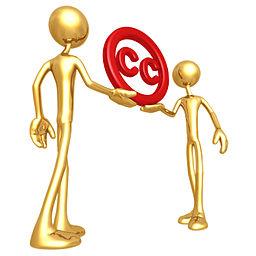posted by Bonnie O'Sullivan on August 1, 2013 - 3:16pm

Did you know that any original work you’ve made, whether that’s a catchy song or a finger painting, is automatically protected under copyright? This is because generally, original creative works are protected under copyright law as soon as they’ve been created, just as long as they’re fixed in a permanent form (for example, recorded or written down or finger painted). You don’t even need to register for copyright protection (although, it's strongly recommended)!
Copyright can give great peace of mind to creators: it protects their work from being used in ways that they might not want it to be used, particularly in protecting their commercial rights to make money from their work.
But sometimes the “All Rights Reserved” rule can seem more restricting than useful. For instance, an independent band might want to offer listeners free songs to download or stream with the understanding that their popularity will grow as more and more people hear their music.
For artists that don't believe in the traditional commercial-based system of copyright or who want to share their work under certain conditions, Creative Commons licences are a great tool!
First developed in 2001, Creative Commons licences are free and are used in addition to any existing copyright licences on the work.
OIMA chose to use Creative Commons licences on the site because we want our users, whether they are artists, music fans or listeners, to have lots of freedom when they upload, download, or view content on our site.
Artists can choose from a variety of six different licences when they register for an artist account on OIMA.
Attribution – People are free to use and alter the artist’s work (even for commercial purposes). But they need to credit the artist for the original creation.
Attribution-ShareAlike – People can use or alter the artist’s work (even for commercial purposes), as long as they credit the original work to the artist. Also, all new works based on the original work will carry the same Attribution-ShareAlike licence.
Attribution-NoDerivs – People can use or share the artist’s work (even for commercial purposes) as long as they credit the artist and don’t alter the work in any way.
Attribution-NonCommercial – People can use or alter the work, as long as they credit the artist and do not use the work (or any of the altered creations) for commercial purposes.
Attribution-NonCommercial-ShareAlike – People can alter and use the work as long as they credit the artist for the original work. They must use the same Attribution-NonCommercial-ShareAlike licence for all works based off of the original.
Attribution-NonCommercial-NoDerivs – People can use or share the work as long as they attribute it to the artist, they don’t use it for commercial purposes, and they don’t alter the work in any way. This is the most restrictive licence.
If a curator is uploading music on an artist’s behalf, the artist's music will automatically be protected under the Attribution-NonCommercial-NoDerivs licence once they sign the Artist Release.
If you’re checking out OIMA simply to listen to some great music or to download a song for your campus or community radio station, make sure to click on the artist’s profile page where you can see what licence the artist has chosen per album. You’re responsible for following the rules of that specific licence!
For further information, I recommend checking out this super helpful video I found while researching. It’s called Creative Commons Kiwi by Creative Commons Aotearoa New Zealand!
My Weekly OIMA Pick
Prayer by Jaron Freeman-Fox
You may be wondering, what kind of music inspires a copyright handbook editor? Well, I can’t speak on behalf of them all, but instrumental fiddle songs are my go-to tunes for copyright contemplation. That’s why Jaron Freeman-Fox’s fiddle music was added directly to my OIMA favourites list! I’ve been playing “Prayer” on repeat all day!
The image in this post is by lumaxart (LuMaxArt Gold Guys With Creative Commons Symbol) [CC-BY-SA-2.0 (http://creativecommons.org/licenses/by-sa/2.0) or CC-BY-SA-2.0 (http://creativecommons.org/licenses/by-sa/2.0)], via Wikimedia Commons


